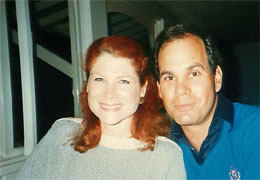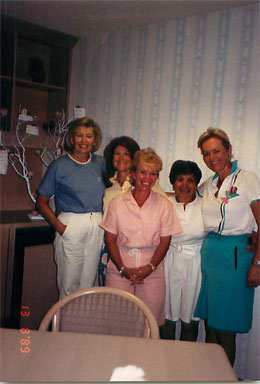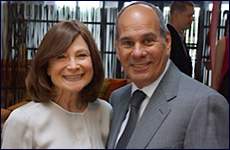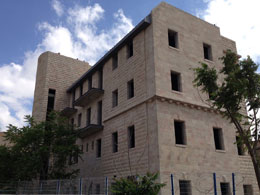 Iran’s Attack on Israel
Iran’s Attack on Israel


13 min read
One woman’s personal crusade against assimilation and intermarriage.
At 42, Bonnie Cohen was living her dream life. Her husband Alan was the CEO of a successful company. They lived in a big house in Southern California, drove a Rolls Royce and a Porsche, and traveled – First Class – all over the world. They climbed the Great Wall of China, but were unaware of another famous Wall in Jerusalem.
The Cohens held a membership in two Jewish institutions: the local Reform Temple, whose services Bonnie half-heartedly attended one day a year, and the local Jewish Country Club, whose golf course Bonnie religiously attended four days a week.
 Bonnie and Alan in the early days.
Bonnie and Alan in the early days.
The Cohens had a son and a daughter, both in good colleges. In fact, the only reason they had joined the Temple was so that their son could have a Bar Mitzvah. They also sent their daughter Sheri to Hebrew School. She called it, “Jew jail,” and dropped out after two years.
Her daughter came home from college and announced that she had joined Jews for Jesus.
Then one autumn day in 1989, while cruising down the highway of her dream life, Bonnie hit a puncture. Her daughter Sheri came home from college and announced that she had joined Jews for Jesus.
“But we’re Jewish,” Bonnie sputtered.
“We’re Jewish,” Sheri shot back, “but we don’t keep kosher and we don’t keep Shabbos, and no one in our family does, and none of our friends do. It’s impossible today to keep the Torah. That’s why Jesus came. Because it’s impossible to keep the Torah.”
 Bonnie with her golfing friends.
Bonnie with her golfing friends.
Bonnie and Alan couldn’t argue the point. They knew nothing about Judaism, but they were confident that the rabbi of their temple could point out to Sheri her theological misconceptions. They dragged their daughter to the rabbi, whom they barely knew. Sheri came armed with a handbook, 365 Prophecies that Prove that Jesus is the Messiah. The clergyman’s response was like fighting a tank with a water pistol. “Sheri,” he said benignly, “I’m not going to argue Scripture with you. You’re a wonderful girl. You have a wonderful family. And the most important thing is family.”
A few more platitudes and the meeting was over.
As they left, he whispered to Alan, “Don’t worry about it. It’s a phase. It will pass.”
It didn’t. Six months later, Sheri was engaged to a born-again Christian.
Bonnie’s best friend commiserated with the Cohens. “It’s a missionary sect,” she agreed. “But I know a rabbi who got my cousin out.”
“The only way you’ll ever be able to reach your daughter is if you learn Judaism.”
Desperate, Alan called the rabbi. He told the Cohens, “The only way you’ll ever be able to reach your daughter is if you learn Judaism and can answer her questions. I’m going to invite your daughter to my home for Shabbos and even if she doesn’t come, I‘d like you two to come.”
Alan adamantly told Bonnie: “If Sheri doesn’t agree to come, do NOT accept the invitation, because I’m not going to anyone’s house for Shabbos, especially an orthodox rabbi.”
On Thursday night, they took Sheri to meet the rabbi. Sitting around his dining room table, he invited Sheri to come for Shabbos. “I’m not interested,” was her curt reply. Then the rabbi turned to the parents. “Bonnie, I would love you and Alan to come. “
Bonnie responded, “We’d love to.” Alan kicked her under the table, but it was too late.
As Bonnie describes that first Shabbos: “They had a very small house, six kids in two rooms. But whatever they had, they wanted to share. They even invited us to stay over. I saw a husband who treated his wife like a princess, and I saw a wife who showed such honor to her husband. They sang and shared words of wisdom, and everything they said made sense.”
The Cohens stayed till 1 am. At the end the rabbi asked them, “Did you have a good time?”
Alan responded enthusiastically: “It was great.”
“So come back next week.”
“Okay,” Alan agreed.
When they left, Bonnie turned to her husband and said, “These are the richest people I ever met in my life, and I want what they have. If this is Judaism, why are they keeping it such a big secret? Why didn’t anyone ever tell me about it?”
Six months later the Cohens made their first trip to Israel, studying Judaism with rabbis from Aish HaTorah. One afternoon someone took Bonnie to meet Rebbetzin Dena Weinberg, the wife of Aish HaTorah’s founder Rabbi Noach Weinberg. Rebbetzin Weinberg ran EYAHT, a small school for young women with little Jewish background.
Bonnie was led into a shabby 3-room basement apartment in the Jerusalem neighborhood of Kiryat Sanz. Taken aback, she wondered, “How in the world would anyone want to study here?”
She met Rebbetzin Weinberg, whom she considered, “the kindest, wisest woman I ever met.” Although she intended to spend only a few minutes in the school, Bonnie was fascinated by the classes and stayed all afternoon.
“If only my daughter had had an opportunity to come here and learn this Jewish wisdom, her life would be very different.”
For the rest of their stay in Jerusalem, Bonnie attended many classes at EYAHT. One day they received the news from America: Sheri had married her born-again Christian fiancé in a church wedding. Bonnie was overwhelmed by the trenchant feeling, “If only my daughter had had an opportunity to come here and learn this Jewish wisdom, her life would be very different.” Out of the smoldering ashes of her dreams for her daughter a wisp of smoke started to take the form of a new dream. “What can I do to make sure this doesn’t happen to other Jewish girls?” Bonnie asked herself. EYAHT was her answer.
Years passed. The Cohens continued to learn Torah and became more observant. While living in the San Fernando Valley, they purchased a condominium in Jerusalem as a second home. When the construction was completed, they came for a ten-day visit in January, 1994. “I fell in love with the Land of Israel,” Bonnie reminisces, and she wanted to stay there. When it was time to return to California, Bonnie cried, begging Alan to stay for one more week.
 Bonnie and Alan today
Bonnie and Alan today
Alan refused. “I can’t be gone from the office one more day,” he insisted. “I have to run my business. If you want a second home in Israel, I have to be able to pay for it.”
His wife’s tears, however, finally won Alan over. “Okay, one more week,” he conceded, “but you have to go back with a smile. No more tears.”
They extended their ticket by one week. In the middle of that week, on January 17, 1994, the deadly Northridge earthquake struck. At 6.7 on the Richter scale, the earthquake killed 67 people, injured 8,700, and caused twenty billion dollars in damage.
The earthquake struck at 4:31 am. Had the Cohens returned to California according to plan, they would have been asleep in their bed, not far from the epicenter, when the earthquake struck.
Alan phoned his business partner and asked him to go to their house and board up any broken windows. A few hours later, the partner called them back to report that their house had suffered major damage, and was condemned by the city.
“If we had been there, do you think we would have been hurt?” Alan asked apprehensively.
“No,” his partner answered. “You would have been dead. Four times dead.”
He went on to describe the scene in their bedroom. A bridge of lights weighing 350 pounds spanned the two armoires on either side of the bed. The partner told how the bridge of lights had flipped off and landed on the top of the bed, just where their heads and shoulders would have been. The thick plate glass mirror behind the bed had shattered into large pieces, slicing through the comforter like a guillotine. A massive chest of drawers usually on the other side of the room had been thrown onto the end of the bed with such force that it had completely collapsed the bed. Their large TV had flown from its nook, and had landed in the middle of the bed.
Alan and Bonnie put down the phone and gazed at each other. When they could speak, their first words were: “What is life all about? How many cars can you drive? How many vacations can you go on? How many rounds of golf can you play? We’re not going to wait for another sign from God.” That very day they decided to move to Israel.
“My respect for my husband zoomed up,” recalls Bonnie. “He was at the top of his earning capacity and his business was growing when he made the decision to move to Israel. Alan couldn’t even read Hebrew, but he decided that his business and all it earned for us was no longer the most important thing in his life.”
Bonnie pauses and adds, “We downsized our life. Which really means that we upgraded our life. I existed in California, but I live in the Land of Israel.”
As the years passed, the Cohens donated generously to Aish HaTorah and to the operating expenses of EYAHT, which remained in a three-room apartment. When the Aish HaTorah World Center, with a large, imposing Beit Midrash [hall of study] for men, was dedicated in 2000, Bonnie decided, “We really need to do something for women.”
 The new EYAHT building.
The new EYAHT building.
She went to Rabbi Noach Weinberg with her idea. “I have this dream,” she told him. “If we raise $1 for every Jew we lost in the Holocaust, we would have 6 million dollars, and we could build a building for women to study Judaism.”
Rabbi Weinberg responded with his signature question: “Bonnie, do you know that Hashem loves you?”
Bonnie responded: “Yes, I know with all my heart that Hashem loves me.”
“Then you’re going to do this,” responded Rabbi Weinberg, “because Hashem wants you to do this, and you’re doing it for all the right reasons, and you’ll be successful.”
Now that she was armed with Rabbi Weinberg’s blessing, Bonnie had only one problem: How was she going to raise $6,000,000 when she had an absolute aversion to asking for anything? “The hardest thing in the world for me was to ask anyone for anything. My mother used to say, ‘You would die of thirst before you’d ask anyone for a glass of water.’”
Everything else necessary to actualize her dream, Bonnie did with fortitude and finesse. She and Alan found a plot of land in central Jerusalem, tore down the ruined building that stood there, and hired an architect to design a five-story building that would house classrooms, dormitory rooms for 72 young women, a multi-media center, a gym, and two kitchens. But how was she – the former country club golfer who drove a Porsche – going to get up the gumption to ask her friends and strangers for money?
Mentally, she turned her approach inside out. She wasn’t taking; she was giving. “I realized I wasn’t asking them for money; I was giving them an opportunity to be part of the greatest mitzvah in the world: to build up the next generation of amazing Jewish women who would marry Jewish and raise Jewish children.”
Still, it was excruciating for Bonnie. She steeled herself and called a wealthy friend, explained her dream, and asked for a donation of one million dollars. The friend said she needed time to think about it, and Bonnie should call back in a week. A week stretched into two, with Bonnie dreading to make the call. Finally Alan insisted, “You have to call her.”
“I can’t,” cried Bonnie. She sat in her bedroom staring at the phone for half an hour. “I couldn’t summon the courage to pick it up. I was so afraid she’d say, ‘No.’”
Alan pushed her; she dialed the number and waited with baited breath. Her friend said, “I have good news and bad news for you. Which do you want first?”
“Give me the bad news,” Bonnie murmured, her heart plummeting.
“We can’t do it all at once. We have to spread it out over three years.” The voice paused. “The good news is that we’re going to give you the million dollars.”
Bonnie gasped, a gasp so loud Alan heard it two rooms away.
Emboldened, the next day, she appealed to a second friend, who donated $800,000. “This will be easy!” Bonnie exulted. She thought she’d have the funds in no time.
She then approached a former golfing partner, a mega-wealthy friend whose foundation gives to charity more than $30,000,000 each year. Back in their country club days, Alan had helped this woman’s son get launched in his chosen career, while Bonnie had done many personal favors for her, so Bonnie assumed that a mega-donation was a shoe-in. Bonnie sat down with her friend, explained her dream, showed her the plans, and asked for a donation.
She felt like she was one-third up Mount Everest and stranded.
The friend gave a wry smile, shook her head, and said, “Bonnie, it’s not my thing.”
Bonnie went home and cried for days. She thought, ““If she’s not going to give me, no one will give me.” She felt like she was one-third up Mount Everest and stranded. She had reached that point by helicopter, but looking up at the sheer ascent in front of her, she realized she would have to climb the rest of the way up step by painful step. And she was as suited for fundraising as a paraplegic is suited for mountain climbing.
Bonnie went to Rebbetzin Weinberg and lamented that she just couldn’t do it. The Rebbetzin encouraged her, “Just say, ‘I’m going to do it with Hashem’s help,’ and you’ll succeed.”
Bonnie went home and broke through the wall of her comfort zone – every day. She mounted repeated mailing campaigns, stuffing and sealing the envelopes and affixing the stamps herself. She made phone calls, her hand freezing on the phone each time. She solicited everyone she met. Dining in a kosher restaurant in New York, she struck up a conversation with the people at the next table and told them she was building a school in Jerusalem for Jewish women. They donated $500.
Little by little, Bonnie has raised $5,700,000. She still needs $300,000 to finish the building. But the opening date of the new EYAHT has been set for January, 2014. “There might be a hole where the elevator is supposed to go,” Bonnie smiles, “but we’re opening.”
“My life is now powered by one ideal: how do I reach more girls, especially today when so many girls are assimilating and intermarrying for no other reason than the lack of a Jewish education. I just want to give girls an opportunity to make an educated decision as to how live their life Jewishly. For all we gave her, that’s an opportunity my daughter didn’t get.”
To help Bonnie reach her goal, click here: https://www.eyaht.info/en/campaign_building
